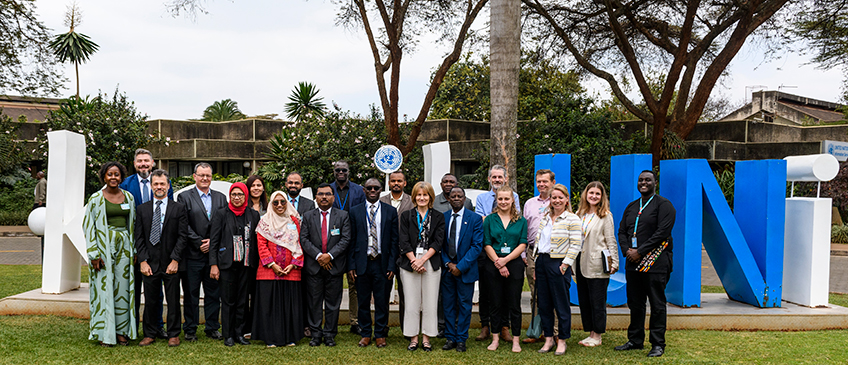Hosted by UN-Habitat at the United Nations Office Nairobi, the Global Geospatial Information Management Section in the United Nations Statistics Division supported the convening of the Eighth meeting of the Expert Group on the Integration of Statistical and Geospatial Information jointly with the seventh meeting of the Working Group on Geospatial Information of the IAEG-SDGs. The were 30 representatives from 11 Member States (consisting of representatives from both national statistical offices and national geospatial information agencies), together with three representatives from SDG custodian agencies participated in the meeting to implement and operationalize the GSGF and SDGs Geospatial Roadmap, anchored by the United Nations Integrated Geospatial Information Framework (UN-IGIF), as the guiding framework that facilitates the integration of statistical and geospatial information,
At the meeting, the Expert Group agreed on actions that will strengthen the bridge between the geospatial and statistical communities and enable countries to advance geo-statistical integration. The immediate actions will focus on developing practical guidance that supports the disaggregation of statistics by geography and identifying an approach that will support the Commission in implementing ECOSOC resolution 2022/3 (Ensuring that the work in the field of statistics and data is adaptive to the changing statistical and data ecosystem). Further, in considering how to strengthen the role of geography within the sustainable development goals and its global indicator framework, the Working Group on Geospatial Information of the IAEG-SDGs agreed on a work plan for 2025 to be submitted to the IAEG-SDGs at its next meeting, and identified potential partnerships with UN Environment Programme and UN-Habitat that can help strengthen the global reporting of SDG indicators. Further details will be found in the groups'respective work plans.
Presentation Materials
-
Agenda item 1: Welcome, introductions, and setting the scene
- Mr Mark Iliffe, UN-GGIMS/SD/DESA
-
Agenda Item 4: The importance of geospatial information in disaggregating the SDGs at local and global levels
- Mr Robert Ndugwa, UN-Habitat
- Ms Diah Retno Badan, Informasi Geospasial (BIG), Indonesia
- Mr Bryce Davenport, US Census Bureau, United States of America
- Ms Sarah Parker, Office for National Statistics, United Kingdom
- Ms Daniella Liona, National Bureau of Statistics, Kenya
- Mr Mark Iliffe, UN-GGIMS/SD/DESA
- Mr Robert Ndugwa, UN-Habitat
-
Agenda Item 6: The business modalities of the IAEG-SDGs WGGI
- Ms Mary Smyth, Central Statistics Office, Ireland and co-Chair IAEG-SDGs WGG
-
Agenda Item 7: National and regional perspectives on geospatially integrated statistical data to national priorities and global development agendas
- Mr Andre Nonguierma, Economic Commission for Africa
- Mr. Shri Subash Chandra Malik, National Statistics Office, Ministry of Statistics and Programme Implementation, India
- Mr Panu Muhli, National Land Survey of Finland, Finland
- Ms Sarah Parker, Office for National Statistics, United Kingdom
-
Agenda Item 8: Sustaining the Global Statistical Geospatial Framework: Towards GSGF 2.0
- Mr Joshua Coutts, US Census Bureau, United States of America and Ms Olive Powell, Office for National Statistics, United Kingdom
-
Agenda Item 9: The Expert Group's First Decade and Eight Years of the IAEG-SDGs: To 2030 and Beyond
- Mr Claudio Stenner, IBGE, Brazil and co-Chair EG-ISGI
-
Agenda Item 11: Accelerating implementation and strengthening geostatistical capacity
- Mr. Jerker Mostrom, Statistics Sweden, Sweden and Mr Joshua Coutts, US Census Bureau, United States of America
-
Agenda Item 12: The UN-IGIF and the GSGF: An Architecture for Geostatistical Integration
- Ms Andrea Santiago, National Institute of Statistics and Geography (INEGI), Mexico

